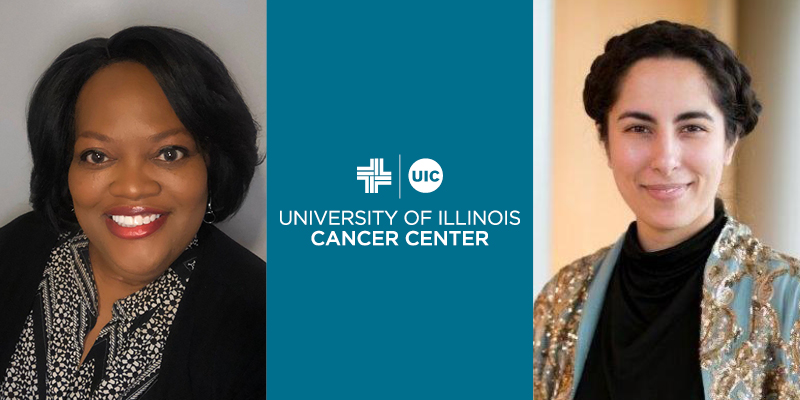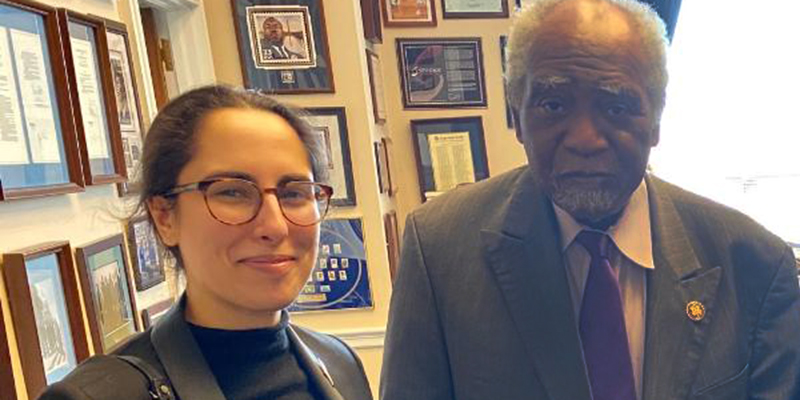
Share on facebook
Facebook
Share on twitter
Twitter
HJR0086 is alive and well.
Kimberly Richardson, PCORI (Patient-Centered Outcomes Research Institute) project coordinator of the University of Illinois Cancer Center Patient Brigade, saw her tireless work pay off last week as the Illinois House of Representatives’ Human Services Committee approved HJR0086, a proposed bill that will create a special commission to study gynecologic cancer, how it will impact Illinois residents, and how best to treat the disease.
Rep. La Shawn K. Ford (D-Chicago) sponsored the bill, with Rep. Mary E. Flowers (D-Chicago) a co-sponsor. Richardson has assisted the lawmakers every step of the way. The measure now moves to a full vote in the House. If successful, the Illinois Senate will then vote on it, with the bill ultimately being sent to Gov. JB Pritzker for his signature.
Headed to the Senate!! Thanks @RepFord8 @RepMaryFlowers for all of your help!! @kitaj_angio @JBurdetteLab @UICancerCenter @CancerAdvocacy @ocrahope @teaminspire #OncAlert pic.twitter.com/Q0AMEZtSRK
— KD Richardson (@KDRichardson924) February 26, 2020
“This demonstrates the capacity of cancer survivors,” Richardson said. “Our cancer stories can impact advocacy in meaningful ways. I was able to do this because of the support I’ve received from the UI Cancer Center and the UI Health Staff.”
When Richardson approached Ford with the idea of a commission to study how gynecologic cancers are treated and researched in Illinois, he provided his full support. Like Richardson, his mother was diagnosed, was treated for and survived ovarian cancer.
“It’s an honor to introduce this resolution to the 101st Illinois State Legislature,” Ford said. “We definitely need to have a strategic approach to fight this disease, and forming a gynecologic commission can achieve that objective.”
Gynecologic cancer starts in a woman’s reproductive organs. It can begin in different places within a woman’s pelvis, the area below the stomach and in between the hip bones. There are five types of gynecologic cancer, according to the Centers for Disease Control and Prevention: cervical, ovarian, uterine, vaginal and vulvar. Each is unique, with different signs and symptoms, different risk factors, and different prevention strategies.
According to the bill, the commission will be comprised of 16 members:
- A representative of the Illinois Comprehensive Cancer Control Program
- The director of the Illinois Department of Insurance, or his or her designee
- 14 appointees: Three members chosen by the Speaker of the House of Representatives, one of whom is an ovarian cancer survivor; a survivor of cervical, vaginal, vulvar, or uterine cancer; and a medical specialist in gynecological cancers
- Three members appointed by the Senate President: a ovarian cancer survivor; a cervical, vaginal, vulvar or uterine cancer survivor; and a medical specialist in gynecological cancers
- Eight members appointed by the Governor: a caregiver of a woman diagnosed with a gynecologic cancer; a medical specialist in gynecological cancers; an individual with expertise in community based health care and issues affecting underserved and vulnerable populations; two individuals representing gynecologic cancer awareness and support groups in Illinois; a researcher specializing in gynecologic cancers; and two members of the public who have expertise in issues relating to the work of the commission
A final report will be provided by the commission to the Illinois General Assembly no later than Dec. 31.

While Richardson was instrumental in advocating for the passage of the gynecologic cancer bill in Springfield last week, Nita Mukand traveled to Washington, D.C., to visit congressional lawmakers and legislative aides to advocate for more and consistent funding for cancer research and biomedical science through the National Institutes of Health and the National Cancer Institute.
Mukand, a student in the UIC College of Pharmacy’s PharmD/MBA program and the first recipient of the UI Cancer Center’s Pfizer Fellowship, was selected for the AACR (American Association for Cancer Research) Early-career Hill Day.
“Sustained and robust funding supports our ability as researchers to explore critical questions in cancer biology, therapy and epidemiology,” said Mukand, who is currently performing a rotation at Northwestern Memorial Hospital in inpatient oncology. NCI initiatives are necessary to reduce disparities both for patients and for funding investigators, she said.
During her day on Capitol Hill, Mukand was paired with Bianca Islam, MD, PhD, Case Western Reserve University/University Hospitals Cleveland Medical Center, to meet legislative staff from Illinois, Ohio, Rhode Island and Georgia. She personally met with Rep. Danny Davis (D-Ill.), whose district includes the UI Cancer Center. Among other topics, Mukand discussed her research in cancer health disparities and the UI Cancer Center’s commitment to reducing those inequalities.
“It is essential to advocate for funding because it makes our research possible, which ultimately improves, extends, and even saves our patients’ lives,” Mukand said. “I hope that legislators never lose sight of government’s vital role in funding cancer cures. Our advocacy helps remind them of that.
“There are many ways that clinicians and researchers can serve patients, and advocacy is an important one of them. I will always strive to be a champion for cancer research, whether at the national, state or local level.”
